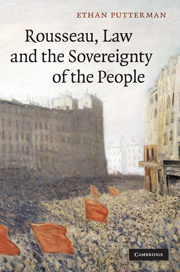Book contents
- Frontmatter
- Contents
- Acknowledgments
- A note on the text
- List of abbreviations
- Introduction: The celestial voice
- 1 Rousseau's concept of law
- 2 Agenda-setting and majority rule
- 3 Democracy and vote rigging
- 4 Popular sovereignty and the republican fear of large assemblies
- 5 Enforcing the laws in Poland and Corsica
- 6 Judging the laws/when legislation fails
- Conclusion: Law and liberty
- Select bibliography
- Name index
- Subject index
Introduction: The celestial voice
Published online by Cambridge University Press: 04 August 2010
- Frontmatter
- Contents
- Acknowledgments
- A note on the text
- List of abbreviations
- Introduction: The celestial voice
- 1 Rousseau's concept of law
- 2 Agenda-setting and majority rule
- 3 Democracy and vote rigging
- 4 Popular sovereignty and the republican fear of large assemblies
- 5 Enforcing the laws in Poland and Corsica
- 6 Judging the laws/when legislation fails
- Conclusion: Law and liberty
- Select bibliography
- Name index
- Subject index
Summary
Few works of political philosophy are as famous or familiar as Jean-Jacques Rousseau's Social Contract. One of the most celebrated and complex of the great masterworks of the Western canon, Rousseau's diminutive treatise on statecraft has been the subject of extended studies and short primers on political philosophy for over two and a half centuries. First published in Amsterdam and Paris in 1762 as part of a broader study of political institutions, the Social Contract remains the most original and, arguably, radical defense of participatory democracy in the whole history of political thought. As one scholar comments, it is a groundbreaking work penned by a thinker who, more than anybody else, ought to be regarded as the “theorist par excellence of participation.”
Widely heralded as a brilliant yet gratuitously utopian book, this most well-known of Rousseau's writings is also considered to be his most fanciful: a fantastically idealistic treatise on the nature of legitimate government intended for an audience in which “the awful distance between the possible and the probable” is knowingly unbridgeable. According to many readers, the political program of the Social Contract was always intended to be a work on the abstract principles of political obligation and never a manual on practical or feasible institutions in any concrete sense. As Jean Guéhenno commented some time ago, Rousseau was a political romantic who was “carried away by his dreams,” sketching down his imaginings “with all the fanaticism of a priest and the fantasy of a backyard inventor.”
- Type
- Chapter
- Information
- Rousseau, Law and the Sovereignty of the People , pp. 1 - 9Publisher: Cambridge University PressPrint publication year: 2010



